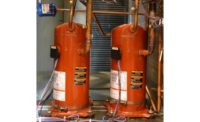Emerson Climate Technologies Inc. marked a milestone in December 2010 when the 150,000th Copeland Scroll digital compressor was shipped to the marine container industry. Emerson Climate Technologies shipped its first scroll digital compressor for refrigerated seagoing containers in 2002, and now builds the compressors in two facilities worldwide.
“Transport refrigeration and air conditioning applications require a high level of system performance in some of the most demanding environments imaginable. Over the past several years, our compressors have proven to deliver these qualities. In fact, many of the top names in transport now count on Copeland scroll compressors for reliability, precision temperature control, and efficiency,” said Keith Browning, vice president & general manager of North American sales at Emerson. “Ten years ago, less than 5 percent of the annual refrigerated container shipments included scroll compressors. Now nearly half of the global shipments use Copeland Scroll technology.”
Refrigerated seagoing containers are being equipped with digital compressor technology for precise temperature and humidity control, said Browning. He said such compressors have been shown to maintain box temperatures to within ±0.5°F (±0.3°C). He noted that is particularly critical for perishable products - like seafood and fruits and vegetables - which travel in seagoing containers on vessels that encounter harsh weather conditions and require tight climate control to protect quality.
Dole Food Co. switched almost exclusively to the use of refrigerated container systems equipped with scroll digital compressors in 2005, it was reported. The company relies on the technology to rapidly remove heat from containers that were filled with bananas in the field. The digital scroll compressor quickly “pulls down” the temperature to the ideal level, and enables a more energy-efficient method for maintaining temperature control throughout the remainder of the bananas’ journey, ultimately resulting in about one-half the traditional energy consumption, according to those involved in the process.
Emerson estimates that use of its digital scroll compressors in refrigerated containers can help the banana industry save more than $10 million in fuel costs and reduce shrink and spoilage by $500 million annually, plus reducing carbon emissions related to banana transportation by 15 percent.
The scroll compressor’s modulation capabilities, and ability to withstand difficult operating conditions, has resulted in the technology being used in a number of additional transport segments such as refrigerated trucks, refrigerated trailers, and bus and rail a/c.
For more information, visit www.emersonclimate.com.
Publication date:02/07/2011








